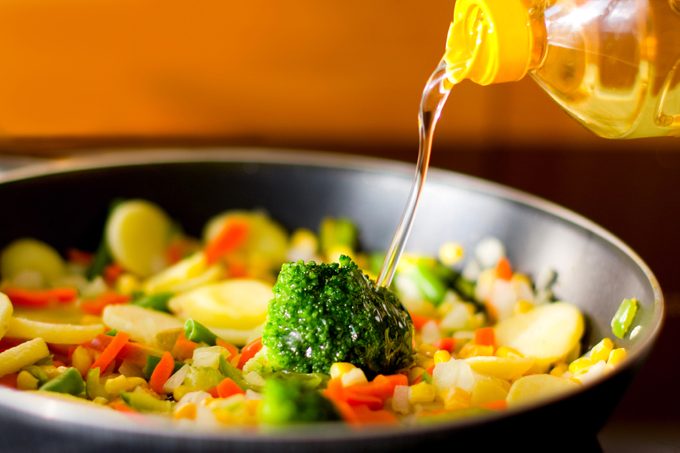Cooking oils, decoded
Curious about which oil you should be cooking with? We weigh the pros and cons of each

Canola, corn, coconut’ we have many choices when it comes to cooking oils, but it can get confusing. Which ones are healthy, which carry risks, and what are the pros and cons of various oil choices? Allow us to clear up some of the myths and misinformation surrounding common cooking oils, based on the latest evidence! Here’s what you might not know about the oils you’re choosing and using.
The less refined, the better for you
When cooking oils are refined (think canola, sunflower, refined avocado or refined grapeseed), they have less flavour and aroma, which some people might prefer for preparing a variety of dishes. Refined oils also store better and can be safely used at higher temperatures. But they’re missing more of the plant. ‘There tend to be more nutrients in the less refined oils,’ says Karen Mornin, a registered dietitian in Vancouver. ‘If you’re getting a good-quality olive oil with a lot of antioxidants, polyphenols and plant chemicals, you’re going to get more benefit.’ Less refined oils are often called ‘virgin’ or ‘extra-virgin,’ while more refined oils may be labelled ‘pure’ or ‘light.’
Temperature matters’ sometimes
Oil becomes toxic if it burns while cooking, so we often refer to an oil’s smoke point when we consider how much heat to use it with. Different oils are safe at different temperatures, but less refined oils generally have lower smoke points. So consider your cooking method before choosing the right oil. Try refined canola oil for high-heat frying, and save extra-virgin olive oil for a simmering stew.
Storage matters, too
Cooking oil oxidizes over time, especially if it’s less refined or is high in Omega-6 polyunsaturated fatty acids. Slow down the degradation by storing it properly. ‘Keep your oils in a dark, cool place, not right beside the stove with the heat and light,’ says Mornin. Some oils, like flaxseed, are best kept refrigerated. Pay attention to the expiration date, and buy a smaller bottle if you don’t think you’ll get through it before it’s rancid. Any time your oil smells or tastes off, throw it away.
You’re better off balancing your oils
We need both Omega-6 and Omega-3 polyunsaturated fatty acids from plant sources, but the balance is critical. Ideally, we should be consuming them in a 3:1 ratio. In fact, our modern-day diet is desperately out of whack. ‘Compared to what our ancestors used to eat, it’s much higher in Omega-6,’ says Mornin. For many North Americans, the ratio is more like 20:1. That’s why it’s better to avoid too much oil that’s high in Omega-6 and simultaneously poor in Omega-3, such as corn and safflower. Cooking oils with a stronger Omega-3 presence include canola, flax and walnut.
Oil in means oil out
To get the full benefit from your healthy cooking oils, be sure to reduce sources of less healthy fat in your diet, like red meat. A UBC study suggests that if your diet already contains a lot of fat, adding Omega-3 may only make matters worse. Researchers fed Omega-3 fish oil to mice that were already eating a diet heavy in Omega-6, then measured higher levels of metabolic stress and inflammation. They theorized that a body already overloaded with fat can’t deal with more, even if it’s healthy. ‘Your enzymes are finite,’ Mornin explains. ‘So when your body is flooded with one type of fat, that’s the one that it’s going to process first.’
Coconut oil may be more hyped than healthy
Coconut oil fans say the stuff promotes weight loss, improves blood sugar, even fights viruses and clears acne. But these health claims are not backed by strong research. ‘There’s just not a lot of evidence to recommend coconut oil as the primary cooking oil,’ says Mornin. ‘Despite all the sensational claims, coconut oil is not a cure-all.’ By contrast, olive oil has been much more closely scrutinized and has shown many more clear benefits. You’re best to choose a variety of healthy oils, not rely on one to solve all your ills.
Expert picks
What are Mornin’s top cooking oils? ‘Number one would be olive oil, number two, avocado, number three, canola ‘ then other oils as you see fit,’ she says. All three of these oils contain a better balance of Omega-6 to Omega-3 fatty acids. Olive and avocado are both available in unrefined forms.
But don’t forget that the original fruit, nut or seed is the least refined of all. When you can, sprinkle sunflower or flax seeds over your meals, or eat coconut meat instead of using the oil. The nutrients will be richer and the oil more stable. ‘It’s always better to go back to whole foods,’ Mornin says.




